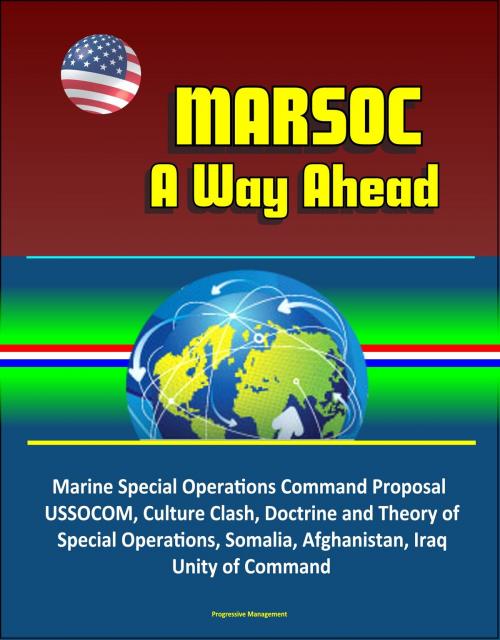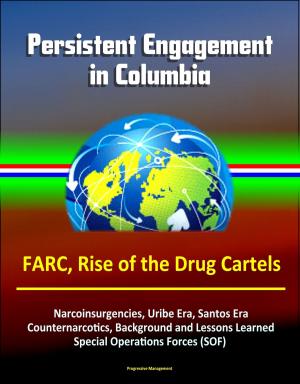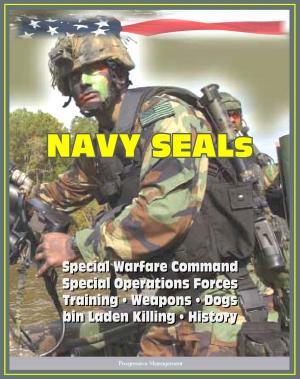MARSOC: A Way Ahead - Marine Special Operations Command Proposal, USSOCOM, Culture Clash, Doctrine and Theory of Special Operations, Somalia, Afghanistan, Iraq, Unity of Command
Nonfiction, History, Military, United States| Author: | Progressive Management | ISBN: | 9781311929846 |
| Publisher: | Progressive Management | Publication: | July 2, 2016 |
| Imprint: | Smashwords Edition | Language: | English |
| Author: | Progressive Management |
| ISBN: | 9781311929846 |
| Publisher: | Progressive Management |
| Publication: | July 2, 2016 |
| Imprint: | Smashwords Edition |
| Language: | English |
This excellent report has been professionally converted for accurate flowing-text e-book format reproduction. The Global War on Terror and the Department of Defense have thrust change upon the Marine Corps and the United States Special Operations Command (USSOCOM). Because the Secretary of Defense mandated that the Marine Corps would create a component in USSOCOM, the window for revolutionary change is open. USSOCOM needs a force with the capabilities of the Marine Expeditionary Unit (Special Operations Capable) (MEU (SOC)). When the United States Marine Corps joins USSOCOM, it should not create a force that duplicates what already exists within that organization and is anathema to the Marine's organizational culture. If the Marine Corps must provide a component to USSOCOM then it should provide a capability that is distinctly, "Marine." The Marine Corps should offer, and USSOCOM should accept placement of all MEU (SOC)'s under the combatant command authority of USSOCOM. In the current war, the MEU (SOC) is the ideal force to provide the power, resilience, and ensure the unity of command for the special operations commander of all forces involved in a special operation.
Additionally the Marine Corps Special Operations Command should have the typical service responsibilities of training and equipping forces, but it should also have an operational responsibility of forming the core of a Joint Task Force for service in "small wars." These changes can create more capability for USSOCOM and place the Marine Corps in the forefront of the Global War on Terror.
CHAPTER ONE - THE MARINES AND USSOCOM * INTRODUCTION * SNOWFLAKES * FOUNDING USSOCOM AND THE IMPACT OF MFP-11 * WHY THE MARINE CORPS DID NOT JOIN USSOCOM * CULTURE CLASH * THE GLOBAL SYNCHRONIZER * CONCLUSION * CHAPTER TWO - THE DOCTRINE AND THEORY OF SPECIAL OPERATIONS * DOCTRINE AS JUDGEMENT CRITERIA * DOCTRINAL MISSIONS * SPECIAL OPERATIONS THEORY * CONCLUSION * CHAPTER THREE - THE RECENT PRACTICE OF SPECIAL OPERATIONS * SOMALIA * AFGHANISTAN * NORTHERN IRAQ * CONCLUSION * CHAPTER FOUR - MEU (SOF) & MARSOC * POWER * RESILIENCE * UNITY OF COMMAND * CURRENT INITIATIVES * CONCLUSION * AREAS FOR FURTHER RESEARCH * APPENDIX A - BIBLIOGRAPHY
This excellent report has been professionally converted for accurate flowing-text e-book format reproduction. The Global War on Terror and the Department of Defense have thrust change upon the Marine Corps and the United States Special Operations Command (USSOCOM). Because the Secretary of Defense mandated that the Marine Corps would create a component in USSOCOM, the window for revolutionary change is open. USSOCOM needs a force with the capabilities of the Marine Expeditionary Unit (Special Operations Capable) (MEU (SOC)). When the United States Marine Corps joins USSOCOM, it should not create a force that duplicates what already exists within that organization and is anathema to the Marine's organizational culture. If the Marine Corps must provide a component to USSOCOM then it should provide a capability that is distinctly, "Marine." The Marine Corps should offer, and USSOCOM should accept placement of all MEU (SOC)'s under the combatant command authority of USSOCOM. In the current war, the MEU (SOC) is the ideal force to provide the power, resilience, and ensure the unity of command for the special operations commander of all forces involved in a special operation.
Additionally the Marine Corps Special Operations Command should have the typical service responsibilities of training and equipping forces, but it should also have an operational responsibility of forming the core of a Joint Task Force for service in "small wars." These changes can create more capability for USSOCOM and place the Marine Corps in the forefront of the Global War on Terror.
CHAPTER ONE - THE MARINES AND USSOCOM * INTRODUCTION * SNOWFLAKES * FOUNDING USSOCOM AND THE IMPACT OF MFP-11 * WHY THE MARINE CORPS DID NOT JOIN USSOCOM * CULTURE CLASH * THE GLOBAL SYNCHRONIZER * CONCLUSION * CHAPTER TWO - THE DOCTRINE AND THEORY OF SPECIAL OPERATIONS * DOCTRINE AS JUDGEMENT CRITERIA * DOCTRINAL MISSIONS * SPECIAL OPERATIONS THEORY * CONCLUSION * CHAPTER THREE - THE RECENT PRACTICE OF SPECIAL OPERATIONS * SOMALIA * AFGHANISTAN * NORTHERN IRAQ * CONCLUSION * CHAPTER FOUR - MEU (SOF) & MARSOC * POWER * RESILIENCE * UNITY OF COMMAND * CURRENT INITIATIVES * CONCLUSION * AREAS FOR FURTHER RESEARCH * APPENDIX A - BIBLIOGRAPHY















